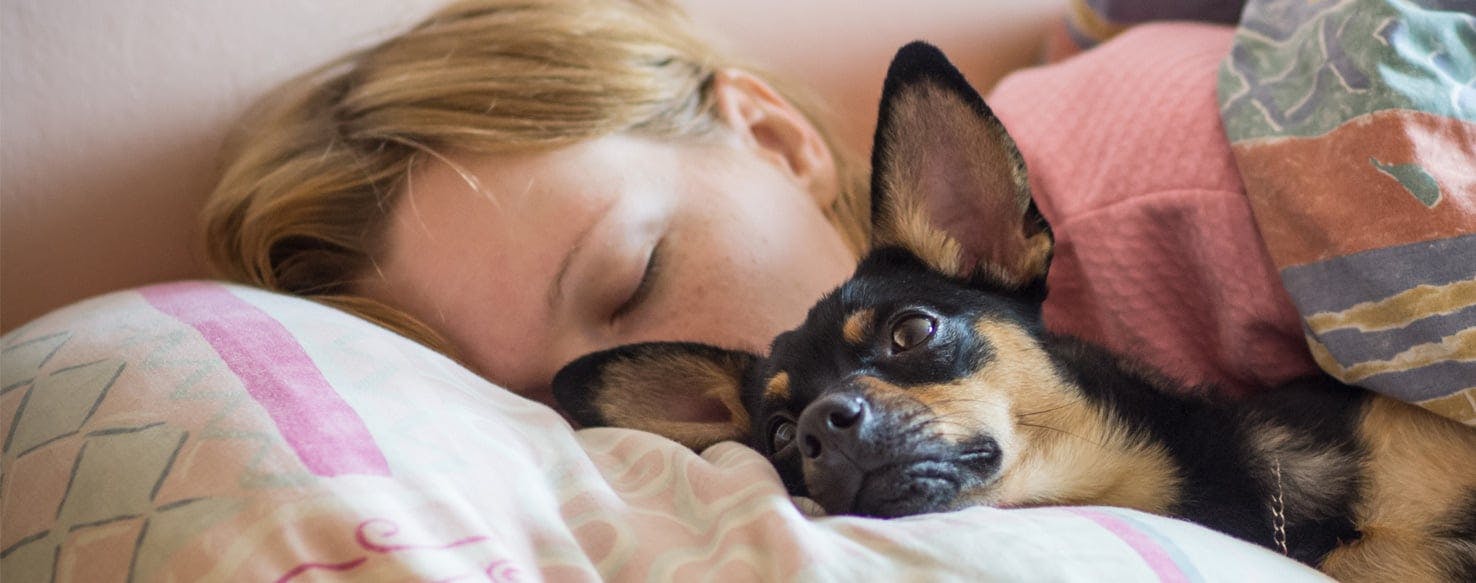- Home
- The Daily Wag!
- Behavior
- Why Dogs Like Sleeping With Humans

Common
Normal
Updated by Mel Lee-Smith — May 8, 2020
Why do dogs like sleeping with humans? For protection, closeness, and warmth — these are a few reasons your dog might be so insistent on sleeping in your bed at night. But is there more to it? It's general knowledge that dogs are pack animals. Not only did their ancestors hunt together, but they also slept together at night for warmth and security. Should you allow your dog on the bed? (After all, you spent so much money on that fancy dog bed...) And if your dog isn’t interested in laying by your side all night, does that mean he doesn’t love you and you're not part of the pack? Keep reading to discover answers to your pressing questions about why dogs like sleeping in bed with their humans.
If you've ever seen a dog give birth or simply admired a litter of puppies, you'd know that newborn puppies huddle together soon after they're born. That's because it's in their nature to sleep in a big puppy pile, snuggled up against their littermates. It’s when they feel most secure and comfortable. No wonder they try to replicate that feeling of warmth and coziness with you even after they grow up!
Your dog wanting to sleep next to you is also a sign of affection and closeness. It means they like your company and consider you a member of the pack. Sleeping by your side also proves their loyalty, trust, and willingness to protect you.
However, if your dog isn’t one to hop on the bed and snuggle with you throughout the night, don’t worry. It's most likely because they're overheated or can't settle — it certainly doesn't mean they don't love you or view you as the pack leader. Your dog might even think your bed is too soft and doesn't provide enough support. Whatever the reason, it's definitely not personal.
Surveys show that about half of all pet parents let their woofers sleep in their bed. Some breeds tend to enjoy cuddles more than others. For example, Retrievers, Collies, and English Bulldogs tend to be more cuddly.
Need advice about your pet's health?
Get answers fast from a veterinary professional 24/7 in the Wag! App.
Get Vet ChatIt's probably safe to say most dogs won't need encouragement to hop on the bed and curl up next to you. Other dogs, however, might not be so keen. (And that's okay!) If sleeping next to your canine cuddle buddy is really important to you, figure out why they're averse to sleeping in your bed. Maybe they're too small to jump onto your bed comfortably. Maybe it's too soft (or not soft enough). Or maybe you fussed at them for getting on your bed before and now they think it's a no-go zone.
One way to encourage your dog to sleep in your bed is to let them sleep in your room if they aren't already. Over time, lure them onto the bed with a tasty treat or two. The key is to create a positive association with the bed. You can also do this by feeding them a meal next to your bed or placing some of their favorite toys on top. However, it's probably not a good idea to play with your dog in bed right before bedtime. You don't want your doggo begging for playtime while you're trying to snooze, after all. If you have a smaller dog and a bed that's too high, consider getting a small bed ladder. (Yes, they're a real thing!)
You might find that, no matter how much encouragement you give, your doggo still doesn't want to sleep in the bed with you. Remember, your dog has boundaries and needs their personal space just like you do. So if you've tried everything, don't keep pushing.
On the other paw, you might prefer to discourage this behavior instead. Maybe your dog takes up too much space, or you toss and turn too much for you to co-sleep comfortably. Whatever the reason, make sure you're consistent when training your dog not to sleep in your bed. Don't allow them on the bed one night and refuse them the next. Ensuring your dog has a comfortable bed will help discourage them from jumping onto yours.
If your dog slept in your bed for a long time and suddenly stopped, it doesn't usually mean something's wrong. However, pay attention to your dog's body language and behaviors. If you notice other signs of physical pain or discomfort, like lack of appetite, it might be a good idea to consult your trusted vet. But if all else seems well, it could just mean their preferences have changed. Or they got a whiff of an interesting scent and wanted to check it out. Or they're not cool with the cats sleeping on the bed. Or a number of other reasons. Just because they don't sleep in bed with you doesn't mean they don't love you unconditionally. (Kind of like how struggling to sleep in a bed next to a snoring partner doesn't mean you don't love them!)
Newborn puppies huddle together with their siblings and mother for warmth and comfort. That's one of the instincts of the pack mentality. However, as our pets grow into rambunctious adolescents and well-trained adults, their people become their new pack. Some dogs will curl right up at the end of your bed each night, while other dogs might prefer to sleep elsewhere. A dog's sleeping preferences are highly individual and may change over time due to a variety of factors. While there are some tried and tested ways to encourage your dog to sleep in bed with you, remember to respect their boundaries above all else.
Written by a Shiba Inu lover Patty Oelze
Veterinary reviewed by:
Published: 02/07/2018, edited: 05/08/2020
More articles by Patty Oelze
